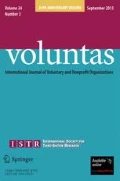Abstract
This paper applies the contrast between idealist and non-idealist modes of thought to an examination and categorization of ideas and practices of voluntary action in Britain in the period from the1880s to the 1990s. In particular, the paper explores: (1) idealism and non-idealism as properties of social theories about voluntary action; (2) idealist and non-idealist social thought in voluntary organizations; (3) pro-state idealist social thought in “official” or governmental circles on relationships with voluntary action, and changes in such thought and in government relationships with voluntary action in the 1970s; (4) innovations in the ways of classifying voluntary organizations; and (5) new approaches to the study of voluntary action. The paper also comments on voluntary action and the “third way.”
Similar content being viewed by others
REFERENCES
Acheson, N. (1995). A partnership of dilemmas and contradictions: Unresolved issues in government— voluntary sector relations. In: Acheson, N., and Williamson, A. (eds.), Voluntary Action and Social Policy in Northern Ireland, Avebury, Aldershot, pp. 33-45.
Ashford, D. (1986). The Emergence of the Welfare States, Blackwell, Oxford.
Barry, F. R. (1960). Asking the Right Questions, Hodder and Stoughton, London.
Beveridge, W. (1942). Social Insurance and Allied Services, Cmd 6404, HMSO, London.
Beveridge, W. (1943). The Pillars of Security, Allen and Unwin. London.
Beveridge, W. (1948). Voluntary Action, Allen and Unwin, London.
Bosanquet, B. (1910). Charity organisation and the majority. Int. J. Ethics 20: 395-408.
Brenton, M. (1985). The Voluntary Sector in British Social Services, Longman. London.
Brown, G. (2001). Let the people look after themselves. The Times, 11 January.
Collini, S. (1976). Hobhouse, Bosanquet and the State: Philosophical idealism and political argument in England 1880–1918. Past and Present 72: 86-111.
Collini, S. (1978). Sociology and idealism in Britain 1880–1920. Eur. J. Sociol. 19: 3-30.
Etzioni, A. (2000). The road to the good society. New Statesman, 15 May, pp. 25-27.
Field, F. (1972). A pressure group for the poor. In: Bull, D. (ed.), Family Poverty (2nd Ed.), Duckworth, London, pp. 145-57.
Finlayson, G. (1993). Citizen, State and Social Wefare in Britain, Clarendon Press, Oxford.
Glennerster, H. (1990). Social policy since the Second World War. In: Hills, J. (ed.), The State of Welfare, Clarendon Press, Oxford.
Green, D. (1996). Community without Politics, Institute of Economic Affairs, London.
Hadley, R., and Hatch, S. (1981). Social Welfare and the Failure of the State, Allen and Unwin, London.
Hall, M. P., and Howes, I. V. (1965). The Church in Social Work, Routledge, London.
Harris, J. (1992). Political thought and the welfare state 1870–1940: An intellectual framework forBritish social policy. Past and Present 135: 116-141 (reprinted in D. Gladstone [ed.] [1999]. Before Beveridge, Institute of Economic Affairs, London, pp. 43–63).
Herbert, A. (1908). The Voluntaryist Creed, Oxford University Press, London.
Hewison, R. (1995). Culture and Consensus, Methuen, London.
Himmelfarb, G. (1995). The De-moralization of Society, Institute of Economic Affairs, London.
Hiskes, R. P. (1983). Herbert Spencer and the liberal idea of community. Rev. Polit. 45: 595-609 (reprinted in J. Offer [ed.] [2000]. Herbert Spencer: Critical Assessments (Vol. 4), Routledge, London and New York, pp. 43–55).
Hobson, J. A. (1896). The social philosophy of charity organisation. Contemp. Rev. 70: 710-727.
Hutchinson Harris, S. (1943). Auberon Herbert: Crusader for Liberty, Williams and Norgate, London.
Landmark Trust (1999). The Landmark Trust Handbook, Landmark Trust, Maidenhead.
Lansley, J. (1996). Membership participation and ideology in large voluntary organisations: The case of the National Trust. Voluntas 7(3): 221-240.
Lewis, J. (1995). The Voluntary Sector, The State and Social Work in Britain, Edward Elgar, Aldershot and Vermont.
Lewis, J. (1999). Reviewing the relationship between the voluntary sector and the state in Britain in the 1990s. Voluntas 10(3): 255-270.
Lowe, R. (1993). The Welfare State in Britain since 1945, Macmillan, Basingstoke.
Mackay, T. (ed.) (1891). A Plea for Liberty, John Murray, London.
Morrow, D., Wilson, D., and Eyben, K. (2000). Reconciliation and Social Inclusion in Rural Areas, Rural Community Network, Cookstown, N. Ireland.
Offer, J. (1999a). Idealist thought, social policy and the rediscovery of informal care. Br. J. Sociol. 50(3): 467-488.
Offer, J. (1999b). Spencer's future of welfare: A vision eclipsed. Sociol. Rev. 47(1): 138-162 (reprinted in J. Offer [ed.] [2000]. Herbert Spencer: Critical Assessments (Vol. 4), London and New York, Routledge, pp. 364–387).
Parker, G. (1990). With Due Care and Attention, Family Policy Studies Centre, London.
Pinker, R. A. (1971). Social Theory and Social Policy, Heinemann, London.
Pinker, R. A. (1983). Social policy in the post-Titmuss era. In: Page, R., and Baldock, P. (eds.), Social Policy Review (Vol. 5), Social Policy Association, Canterbury.
Scott, D. (1971). A. D. Lindsay: A Biography, Basil Blackwell, Oxford.
Spencer, H. (1910). The Principles of Ethics (2 Vols.), Appleton, New York and London.
Taylor, M. W. (1992). Men versus The State, Clarendon Press, Oxford.
Webb, S., and Webb, B. (1912). The Prevention of Destitution (special edition printed for the use of trade unionists of the United Kingdom).
Weinstein, D. (1998). Equal Freedom and Utility: Herbert Spencer's Liberal Utilitarianism, CambridgeUniversity Press, Cambridge.
Whelan, R. (1996). The Corrosion of Charity, Institute of Economic Affairs, London.
Wolfenden Report (1978). The Future of Voluntary Organisations, Croom Helm, London.
Author information
Authors and Affiliations
Rights and permissions
About this article
Cite this article
Offer, J. Idealism Versus Non-Idealism: New Light on Social Policy and Voluntary Action in Britain Since 1880. VOLUNTAS: International Journal of Voluntary and Nonprofit Organizations 14, 227–240 (2003). https://doi.org/10.1023/A:1023904212179
Issue Date:
DOI: https://doi.org/10.1023/A:1023904212179



